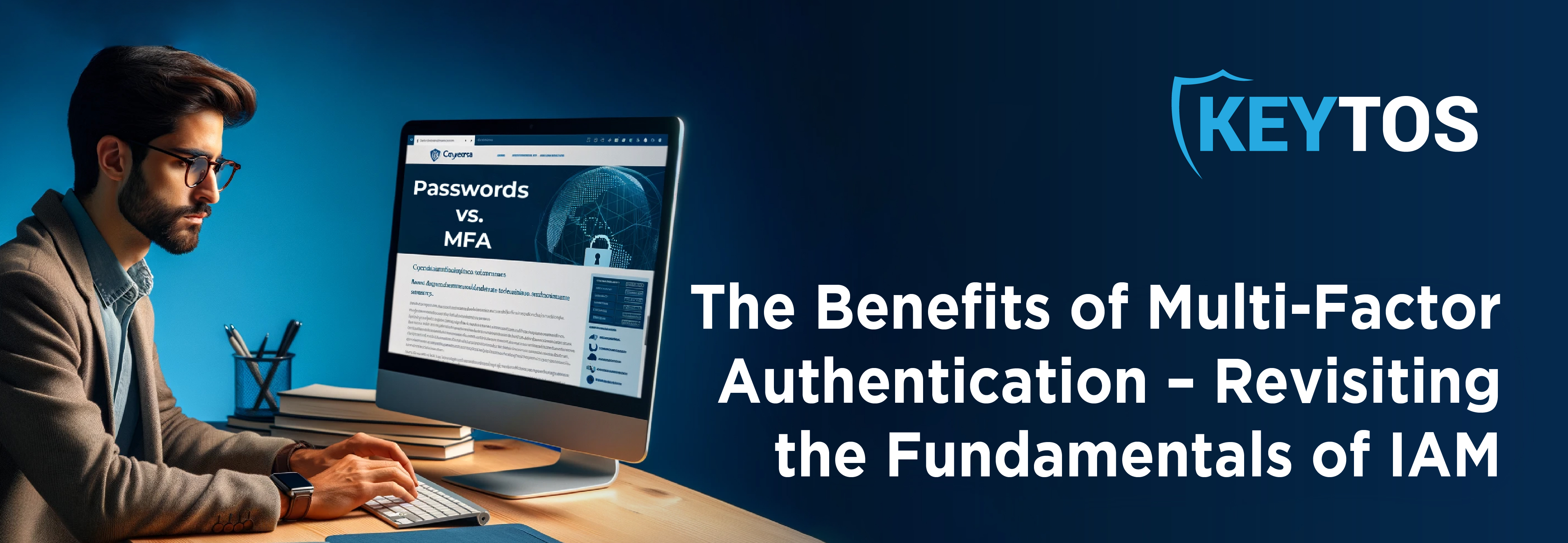
The Benefits of Multi-Factor Authentication – Revisiting the Fundamentals of IAM
Why is MFA Better than Traditional Authentication Methods?
As I sat down to begin this post about how and why MFA is superior to traditional password-based authentication, I thought to myself, “Isn’t this kinda obvious? Shouldn’t I be writing more technical content about the intricacies of MFA? Doesn’t everyone already know that passwords are a problem? This’ll probably be too remedial for our audience.” Then, in a moment of clarity, it dawned on me. I came to the realization that there are quite literally thousands of companies around the world that still rely on password-based authentication. They’ve probably haven’t ever researched the topic, and outlining the benefits of MFA compared to passwords would be exceptionally useful. That considered, I decided to forge ahead, put on my thinking cap, and do my best to outline the benefits of using MFA. Let’s get started.
What is MFA?
While misinformed individuals may disagree with the following definition of MFA, you can consider this to be gospel. It comes directly from the Glossary section of the National Institute of Standards and Technology’s website. MFA is a “system that requires more than one distinct authentication factor for successful authentication. Multifactor authentication can be performed using a multifactor authenticator or by a combination of authenticators that provide different factors. The three authentication factors are something you know, something you have, and something you are.”
How is MFA More Secure than Passwords?
We’ve written extensively about the problem with passwords, but it’s never a bad idea to go over the fundamentals. If we boil things down, the real issue with passwords they’re easily compromised, and accounted for roughly 81% of all cyber-related breaches in 2023. From sharing, overuse, fatigue, and more, they’re simply not enough to protect you in today’s modern security environment.
Increased Security: MFA requires multiple forms of verification, not just a password. This means a potential intruder must compromise more than one type of credential to gain access, significantly increasing the difficulty of unauthorized access. MFA often includes a combination of something you know (like a password), something you have (like a hardware key or smartphone), and on occasion, something you are (like a fingerprint or facial recognition). This layered approach and diversity makes it harder for an attacker to replicate or steal all necessary credentials as more than one factor would need to be compromised.
Reduced Reliance on Passwords: If we’ve said it once, we’ve said it a million times. Passwords are a problem! They’re weak, reused across multiple sites, and easily phished. MFA reduces the reliance on passwords, the most susceptible vector in the vast majority of attacks.
Mitigate Phishing and Social Engineering: These kinds of attacks often target passwords. With MFA, even if an attacker obtains a password through phishing, they still need the additional authentication factor, which is significantly more difficult to acquire. …Don’t be like the people from MGM…
Protect Against Automated Attacks: Auto-attacks like brute force or credential stuffing rely on trying numerous password combinations. MFA effectively nullifies these attacks since the password alone is insufficient for access.
Dynamic Authentication: Many MFA systems use one-time codes or tokens that change frequently. This means that even if an attacker intercepts a code, it will be useless after a very short amount of time.
Increased Awareness and Security Culture: The use of MFA can increase security awareness among users, making them more mindful of security practices in general. Personally, every time I glance down at my YubiKey, I’m reminded that my organization takes authentication security VERY seriously. From the end user’s standpoint, it does certainly make me more mindful of suspicious things such as e-mails and text messages.
Compliance with Industry-Specific Regulations: Many industries now require or highly-recommend MFA due to its enhanced security. It helps in meeting compliance standards for data protection and privacy laws. Regulations like the Payment Card Industry Data Security Standard (PCI DSS), HIPAA, FISMA, and FERPA all state that MFA is required in order to comply with their bylaws.
What Else Should You Know About MFA?
Not all MFA methods give you the same level of protection. Some MFA types are better than others—phishing-resistant MFA is the standard all industry leaders should strive for, but any MFA is better than no MFA. The only widely available phishing-resistant authentication at the moment is FIDO/WebAuthn credentials. The Cybersecurity and Infrastructure Security Agency, more commonly referred to as CISA, urges all organizations to start planning a move to FIDO because when a malicious cyber actor tricks a user into logging into a fake website, the FIDO protocol will block the attempt. Now that’s what I call security!
Moving to MFA
If you’ve made it this far, you’re most likely thinking to yourself, “Alright, makes sense. Passwords aren’t enough to secure my organization. I need to make the move to MFA, but how the heck to I get started?” Glad you asked! At Keytos, we’ve made it our mission to make it as easy as possible for business of all shapes and sizes make the move to MFA. Our revolutionary tool, EZCMS, is the industry’s gold standard when it comes to securing the way your organization authenticates.


